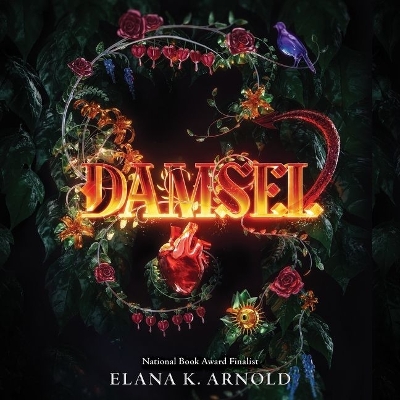
*A 2019 Michael L. Printz Award Honor Book*
A dark, twisted, unforgettable fairy tale from Elana K. Arnold, author of the National Book Award finalist What Girls Are Made Of
The rite has existed for as long as anyone can remember: When the king dies, his son the prince must venture out into the gray lands, slay a fierce dragon, and rescue a damsel to be his bride. This is the way things have always been.
When Ama wakes in the arms of Prince Emory, she knows none of this. She has no memory of what came before she was captured by the dragon or what horrors she faced in its lair. She knows only this handsome young man, the story he tells of her rescue, and her destiny of sitting on a throne beside him. It's all like a dream, like something from a fairy tale.
As Ama follows Emory to the kingdom of Harding, however, she discovers that not all is as it seems. There is more to the legends of the dragons and the damsels than anyone knows, and the greatest threats may not be behind her, but around her, now, and closing in.
- ISBN10 1982551992
- ISBN13 9781982551995
- Publish Date 2 October 2018
- Publish Status Active
- Publisher HarperCollins Publishers Inc
- Imprint HarperCollins
- Edition Library Edition
- Format Audiobook (CD)
- Duration 7 hours and 41 minutes
- Language English
Reviews


Djilan
I'm still a bit conflicted about this one. I think it's a good and well written story, but did I like it? I'm not sure yet..
It's quite the anti-romance and I wasn't expecting it to be. But it does bring a good counterbalance to all the rescued 'Damsel in distress' stories we are used to reading.

Stephanie
I really did not care for this book at all. I saw a lot of reviews on GoodReads call this a feminist fairy tale. I think that does feminism a disservice. Clearly the lesson here was men ruin women. That is all they exist for and not one of them can be a good human being. Arnold beats you over the head with that. There was not literally one good man in the whole story unless you count the glassblower who tolerated her and then sold her work for his own personal gain.
When Arnold isn't explaining all the ways men suck she's using every descriptor for genitalia she can think of: yard, turkey leg, horn, tusk, "his measure"; I think everything except penis. Oh and one female character described her own lady parts as "a lump of warm, moist dough" post-sex. Gag!
The most troubling aspect of this entire book is the fact that it is being marketed to young adults. I was horrified. Yes, I do understand that teens can handle much more than we give them credit for. The thing that got me was if Damsel was picked up by a 12 year old and that 12 year old was served up all these issues in a book that doesn't really address them all that well. A well meaning librarian and/or parent wouldn't realize everything loaded into this slim novel based on either the cover or the synopsis. I can't emphasize this enough: this book is meant for the older crowd of "young adult" at best.
I only finished Damsel by Elana Arnold because I had borrowed the audio version on Hoopla and it was a very quick listen/read. I have to say I kind of regret finishing it but I won't be picking up her books again. I am SO glad I had canceled my pre-order for this book and borrowed it from the library instead. I would have been really unhappy with the waste of $10.
My Favorite Half-Night Stand by Christina Lauren was my first ever Christina Lauren book! It certainly won't be the last time I read them. This book was JUST the right blend of light hearted rom-com and serious relationship hurdles.
I can't imagine anything more terrifying than putting one of you closest friendships on the line to see if there's something more. I think Lauren did a fantastic job of offering Millie and Reed a safe space to begin to explore that possibility even if only half of them knew it.
Millie and Reed's reactions seemed pretty realistic and grounded. That's what I really loved about this book: it wasn't far fetched and I could see it happening. I loved this group of friends and I really wanted to spend more time with them.
I may have had a huge cheesy smile on my face but I was pretty bummed when it ended. I'm kinda hoping the rest of the guys will get their stories as well!
I picked up Every Heart a Doorway by Seanan McGuire after seeing it pop up in a few BookTube videos. Once I saw how short the book was I decided to give the series a try. I wasn't disappointed! I found McGuire's concept of portal worlds fascinating. I'm very much looking forward to the rest of the series. As this was the introductory book there was a lot to learn.
Every Heart a Doorway told Nancy's story and as Nancy learns things so does the reader. Every character we meet is just a little "not normal". Time in a completely different world has altered them forever.
Nancy spent time in The Halls of the Dead. This book really explored the ways in which the kids would work to try to get back to their portal worlds. I did have suspicions about the mysteries occurring around the school. They turned out to be right but I couldn't pin a motive.
I'll be curious to see how the series continues. While the story was finished for Nancy I still wanted more. I suppose that means it was a great book!

Stephanie

Jo
I've wanted to read Damsel by Elana K. Arnold since I first heard of it. A feminist story that takes fairy tale tropes and turn them on their head? A story that makes us question damsels and heroic princes, and the life that comes after. But while Damsel is a powerful and thought-provoking story, I was a little disappointed.
The young woman wakes up in Prince Emory's arms, naked, with no memory of anything that came before. Prince Emory tells her that she is a damsel, who was held captive by a dragon, and he has rescued her. As far back as anyone can remember, this is how it has always been: for a prince to become king, he must rescue a damsel from a dragon, and then she will become his wife, his queen. He gives the girl a name - Ama, he gives her a home, he gives her clothes, he gives her servants, and a life of luxury. But who is she? She has no recollection of anything, but discovers quickly what is expected of her. Emory prefers it when she is docile and submissive, when she asks for his permission, when she says "please", when she is need of his rescue. She is not allowed to do as she wishes, she is not supposed to want anything. But she does want - or rather, she doesn't want this life. She is isolated, friendless and alone in a palace surrounded by servants. But every now and then, she will have a flicker of memory; colour, heat, something, and she knows there has to be more to her and why she was being held captive by the dragon than anyone is telling her. But she is just a damsel, to become just a queen, and it is not her place to question.
'"It is a king's world in which we find ourselves, Ama. A woman, you see, is a vessel. And it is a vessel's duty to be filled. What is a cup without wine? What is a vase without flowers?"' (p176)
As I've said, Damsel is very powerful and thought-provoking. It takes what we know of fairy tales, and makes us question everything. Does a damsel really need rescuing? Why does she have to marry her rescuer? What is her life like after she has been rescued? Does she get a say in any of it at all? Damsel is a story that will make you so very angry as you watch Emory control Ama, and watch Ama bend and fold herself in order to please him, just so that she has an easier life.
'"That is the way of being a woman, to carve away at herself , to fit herself to the task, but, also, to be able to carve herself in a different way, when a different shape is needed."' (p173)
This is not an easy book to read. Ama is trapped in the life that has been forced upon her, and has no say in anything, and you can feel it with her. What is so startling is how it is written; it's written just like a fairy tale, enchanting and captivating, and then you'll have the prince's attitude towards women, or a lesson taught by a servant to Ama about the role of women strike you like a punch in the gut. In this fairy tale, told in a way that seems magical and lovely, we get a story that is a lot more likely.
'"You see, Ama, it is for men to create. It is for men to decide. It is for men to speak. It is your place to listen, and follow, and gestate. And those are no small things! For without women to listen, how would men's words be heard? Without your fertile womb, how could my son hope to grow? You are important, Ama. Desperately important. But do not overreach."' (p303)
'Fabiana blinked at her. "Lady," she said finally, "you are greatly mistaken if you think it matters one whit whether I find pleasure or pain with my king's yard, or, for that matter, whether or not you do. What matters, only, is my king's pleasure. You, and I, and whichever other girls take his fancy, we are all servants to that."' (p167)
'"And that is the way it has always been," the queen mother said again. "And if something is the way it has always been, who are we to wish it otherwise? Who are we to want anything at all? Who are we to desire?"' (p292)
There are moments of completely casual sexism, and then there are terrible, horrifying moments that made me feel sick. This book really is staggering. What I found interesting was how the life of the lynx cub Ama's rescues and makes a pet, Sorrow, is almost a mirror of her own.
'If Sorrow were to be allowed to stay, there were certain things that she would need to be trained away from doing, and Ama knew it. The lynx must not bite, or claw, or growl--most especially, she must not menace Emory. She must be tamed. She must be controllable. She must learn to submit to the powers greater than she, if Ama were to protect her.' (p223)
'What was wrong with this animal? Did she not know that her very ability to stay at the castle depended on Ama's ability to bring her to heel? Did she not understand that it was her duty to submit to Ama, just as it was Ama's duty to submit to Emory? And why should Sorrow feel as though she had any right to an opinion, or a preference, or a desire at all, for that matter?' (p271)
The last quote makes it sound like Ama treats her lynx cruelly, but it's coming from frustration. She loves Sorrow, and is desperate to keep her safe, because Emory has threatened to kill her several times. If Ama cannot train her, he will kill her. And there's the frustration that she has to bend to the will of others herself, and how trapped she feels. And that she is being told the only way to train the lynx is to make her fear her as well as respect her, and she is being told to strike her, and she desperately doesn't want to. Everything is coming to ahead, and Ama is struggling to cope.
As powerful and thought-provoking as Damsel it, I was disappointed in how very little happens. I get the story is about Ama's life at the castle, the treatment from Emory, the expectations of and attitudes towards women, and in a sense, that's why nothing happens, because that is her life... but there were quite a number of times when I was just waiting for more. The big moments were at the beginning and the end, with a smaller one in the middle, but otherwise, it's just normal, everyday, oppressive life.
I was also disappointed that I actually worked out the mystery behind Ama's life before she was rescued very early on. I don't know if I just figured it out, or if it was obvious, but it did bother me that Ama was questioning her past, and I knew from the offset. I would have liked the hints to be a little more subtle. And the ending, where Ama discovers the truth, and the consequences of that just happened so fast. It was a matter of pages, and it was over. I would have preferred that to be drawn out longer, and had some more questions answered. We find out what Emory did to conquer the dragon, (and what his third weapon - on top of his sword and his brain - was, which I found very interesting), but not the reason behind why what he did worked, or what exactly happened. Nor how the very end of the story happens, either. Those are details I feel are needed to make the story a little more believable.
Damsel is an important story, and one everyone should read, but I also expected more. So I'm left with mixed feelings. As long as you don't expect much once Ama has been rescued, I think Damsel will be an enjoyable - though rage-inducing - read.

shannonmiz
This is quite a unique, feminist fairy tale! First- let me just put out a trigger warning for... Idk, literally everything? Perhaps I should have made more note of this as I was reading, but I didn't, so just... lots of awful junk goes down, but if you are able to read it, it does lead to a story that will make you as furious about our misogynist society as you need to be.
It poses, at first, as a quaint fairy tale, with a prince and a dragon. Though you can kind of tell that the prince is a bit of an asshat from the start, he isn't wholly awful. At first, anyway. But I think that's part of the genius- he isn't the most awful, so he thinks he's a real swell guy. (Don't worry, the story delves much deeper!) It's dark to be sure. The stuff that happens to Ama, that happens to all the women, isn't pretty, and it isn't pleasant. But of course, everyone wants Ama to accept it because that's "just the way things are". Which... who among us hasn't heard that line of B.S. before?
I really think that this is a story best experienced with knowing as little as possible going in, so I am done. The only thing I'd have liked a little more of is possibly a stronger connection with Ama, but overall I absolutely flew through reading this. It wasn't as much the story (though I did enjoy the story itself too!) as the idea that the author truly understands how it feels to be... well, not a man in a male-dominated society. It's a feeling of someone hearing you, in a sense.
Bottom Line: Definitely dark, definitely unsettling, but absolutely worth the read if you're game.
